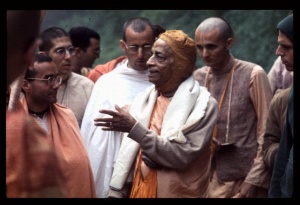SB 10.4.4: Difference between revisions
m (1 revision(s)) |
No edit summary |
||
| Line 1: | Line 1: | ||
{{info | {{info | ||
|speaker= | |speaker=Queen Devakī | ||
|listener=King | |listener=King Kaṁsa | ||
}} | }} | ||
[[Category:Srimad-Bhagavatam - Canto 10 Chapter 04|s04 ]] | |||
[[Category:Bhagavatam Verses Spoken by Queen Devaki - Vanisource|100404]] | |||
<div style="float:left">'''[[Srimad-Bhagavatam]] - [[SB 10|Tenth Canto]] - [[SB 10.4: The Atrocities of King Kamsa|Chapter 4: The Atrocities of King Kaḿsa]]'''</div> | |||
<div style="float:right">[[File:Go-previous.png|link=SB 10.4.3]] '''[[SB 10.4.3]] - [[SB 10.4.5]]''' [[File:Go-next.png|link=SB 10.4.5]]</div> | |||
{{RandomImage}} | |||
==== TEXT 4 ==== | ==== TEXT 4 ==== | ||
<div | <div class="verse"> | ||
tam āha bhrātaraṁ devī | :tam āha bhrātaraṁ devī | ||
kṛpaṇā karuṇaṁ satī | :kṛpaṇā karuṇaṁ satī | ||
snuṣeyaṁ tava kalyāṇa | :snuṣeyaṁ tava kalyāṇa | ||
striyaṁ mā hantum arhasi | :striyaṁ mā hantum arhasi | ||
</div> | </div> | ||
| Line 17: | Line 22: | ||
==== SYNONYMS ==== | ==== SYNONYMS ==== | ||
<div | <div class="synonyms"> | ||
''tam''—unto Kaṁsa; ''āha''—said; ''bhrātaram''—her brother; ''devī''—mother Devakī; ''kṛpaṇā''—helplessly; ''karuṇam''—piteously; ''satī''—the chaste lady; ''snuṣā iyam tava''—this child will be your daughter-in-law, the wife of your future son; ''kalyāṇa''—O all-auspicious one; ''striyam''—a woman; ''mā''—not; ''hantum''—to kill; ''arhasi''—you deserve. | |||
</div> | </div> | ||
| Line 24: | Line 29: | ||
==== TRANSLATION ==== | ==== TRANSLATION ==== | ||
<div | <div class="translation"> | ||
Devakī helplessly, piteously appealed to Kaṁsa: My dear brother, all good fortune unto you. Don't kill this girl. She will be your daughter-in-law. Indeed, it is unworthy of you to kill a woman. | Devakī helplessly, piteously appealed to Kaṁsa: My dear brother, all good fortune unto you. Don't kill this girl. She will be your daughter-in-law. Indeed, it is unworthy of you to kill a woman. | ||
</div> | </div> | ||
| Line 31: | Line 36: | ||
==== PURPORT ==== | ==== PURPORT ==== | ||
<div | <div class="purport"> | ||
Kaṁsa had previously excused Devakī because he thought that a woman should not be killed, especially when pregnant. But now, by the influence of māyā, he was prepared to kill a woman—not only a woman, but a small, helpless newborn child. Devakī wanted to save her brother from this terrible, sinful act. Therefore she told him, "Don't be so atrocious as to kill a female child. Let there be all good fortune for you." Demons can do anything for their personal benefit, not considering what is pious or vicious. But Devakī, on the contrary, although safe because she had already given birth to her own son, Kṛṣṇa, was anxious to save the daughter of someone else. This was natural for her. | Kaṁsa had previously excused Devakī because he thought that a woman should not be killed, especially when pregnant. But now, by the influence of ''māyā'', he was prepared to kill a woman—not only a woman, but a small, helpless newborn child. Devakī wanted to save her brother from this terrible, sinful act. Therefore she told him, "Don't be so atrocious as to kill a female child. Let there be all good fortune for you." Demons can do anything for their personal benefit, not considering what is pious or vicious. But Devakī, on the contrary, although safe because she had already given birth to her own son, Kṛṣṇa, was anxious to save the daughter of someone else. This was natural for her. | ||
</div> | </div> | ||
__NOTOC__ | |||
<div style="float:right; clear:both;">[[File:Go-previous.png|link=SB 10.4.3]] '''[[SB 10.4.3]] - [[SB 10.4.5]]''' [[File:Go-next.png|link=SB 10.4.5]]</div> | |||
__NOTOC__ | |||
__NOEDITSECTION__ | |||
Revision as of 03:22, 19 May 2021

A.C. Bhaktivedanta Swami Prabhupada
TEXT 4
- tam āha bhrātaraṁ devī
- kṛpaṇā karuṇaṁ satī
- snuṣeyaṁ tava kalyāṇa
- striyaṁ mā hantum arhasi
SYNONYMS
tam—unto Kaṁsa; āha—said; bhrātaram—her brother; devī—mother Devakī; kṛpaṇā—helplessly; karuṇam—piteously; satī—the chaste lady; snuṣā iyam tava—this child will be your daughter-in-law, the wife of your future son; kalyāṇa—O all-auspicious one; striyam—a woman; mā—not; hantum—to kill; arhasi—you deserve.
TRANSLATION
Devakī helplessly, piteously appealed to Kaṁsa: My dear brother, all good fortune unto you. Don't kill this girl. She will be your daughter-in-law. Indeed, it is unworthy of you to kill a woman.
PURPORT
Kaṁsa had previously excused Devakī because he thought that a woman should not be killed, especially when pregnant. But now, by the influence of māyā, he was prepared to kill a woman—not only a woman, but a small, helpless newborn child. Devakī wanted to save her brother from this terrible, sinful act. Therefore she told him, "Don't be so atrocious as to kill a female child. Let there be all good fortune for you." Demons can do anything for their personal benefit, not considering what is pious or vicious. But Devakī, on the contrary, although safe because she had already given birth to her own son, Kṛṣṇa, was anxious to save the daughter of someone else. This was natural for her.